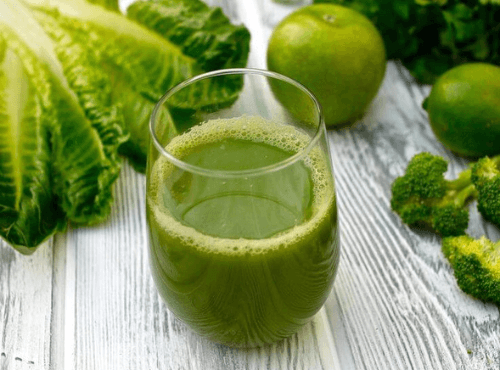If you have a large stock of lettuce at home and are confused about using them, juicing them can be a handy alternative. But will this green veggie yield enough juice?
You can juice lettuce because it is full of nutrition. Transfer some romaine or butterhead type to the juicer along with some water to make this juice. You can also add fruits or veggie juices to enhance the flavors. Lettuce juice has a soft sweet-bitter taste that is easy to drink once in a while.
The consumption rate of lettuce has shown a positive increase over the last couple of decades. And, it is justifiable as this wonder veggie is available everywhere and for everyone. Let’s find out how you can convert lettuce into a glass full of juice.
Table of Contents
Is It A Good Idea To Juice Lettuce?
Lettuce is a popular leafy vegetable, with most varieties eaten fresh and served commonly as the base for green salads. They add an element of crunch and mild flavor to your wraps, burgers, sandwiches, and whatnot. Besides its bright and attractive color, lettuce has endless health benefits.
Lettuce has antioxidants, vitamins such as A, C, and K, and many other nutrients. Thus, it is not wrong to claim that lettuce is good for juice as it will improve our health. Moreover, its pleasant subtle bitterness with a hint of nutty and buttery flavor makes it worth putting in a juicer and trying as a drink. It also has high water content, which means it blends easily and doesn’t have a strong flavor like kale.
So, if you want to add some greens to your juice, you can opt for green leaf, romaine, red, and butter lettuce. All these options are great to blend with fruits, so you get a balanced ratio of sugar and mildly bitter taste. Juicing lettuce will give you access to the nutrients in this leafy wonder with a hydrating effect.
A Simple And Easy Way To Juice Lettuce
Lettuce is relatively an easy veggie to work with, and you don’t have to own an expensive juicing machine for it. As long as you own a decent juicer or a blender, you can make homemade, freshly pressed lettuce juice with these simple steps.
1. Choose the correct lettuce
While almost all varieties of lettuce are juiceable, you need to look for the ones that are fresh and heavy. One way to figure it out is by going with the lettuce with darker leaves because they are fresher and contain more nutrients.
Although it is possible to juice iceberg lettuce, they are nutritionally far less than dark green lettuce. Its component value is similar to a glass of water, and thus you wouldn’t benefit much from it. So, better opt for the dark kinds, including romaine, butterhead (butter crunch), and bibb lettuce.
2. Clean the green veggie
Once you pick the lettuce for juicing, it’s time to give them a thorough clean. One of the most effective techniques for washing the salad plant is by giving them a cold water bath. Firstly, inspect the green veggie for visible signs of contamination and remove any portion that seems damaged. Afterward, fill the sink with cool water and soak the lettuce in it for about ten minutes, and all the dirt and grit will wash away.
3. Chop the dark green lettuce
Now that the lettuce is clean, you’ll have to chop them evenly. You might need to cut a lot of lettuce as they don’t have much moisture content. Thus, to get a decent juice yield, you might require about eleven cups of shredded salad plant and then toss them into a juicer.
4. Use a juicer
The next step is to run the chopped lettuce through the juicer. At this point, if you find the liquid a bit concentrated, you can add water to dilute the consistency. Pour in around 1/4th cup of water to expand the drink, and you can always increase the amount if you feel the need. You will finally get one full glass of lettuce juice rich in vitamins and minerals.
5. Combine with zesty or sweet flavors
Lettuce has a mild flavor which allows you to combine it with other ingredients. Squeeze in some lemon juice for a tangy effect or fruits and vegetables such as apples, cucumbers, etc. After everything is well-combined, drink the juice immediately for the best experience. Or, you can also store it in the refrigerator for some time.
Can You Juice Lettuce Leaves?
You might think Lettuce leaves are only suitable for serving raw, in dressings, or tossed with other salad ingredients. However, that is not entirely accurate as all types of lettuce leaves are perfect for juicing. Butterhead leaves have a smooth and delicate texture and are often more expensive than others. The tender green goodness can be a great addition to your daily juice routine.
On the other hand, iceberg leaves are more crunchy and tightly packed. Their nutritional value is low in comparison to romaine and butterhead. So, these leaves are better for delicious salads and do not have much juicing potential. Thus, it is necessary to go for the lettuce leaves with more juice yield and health benefits.
Super Hydrating Lettuce Juice Recipes
Lettuce increasing demand among juicing enthusiasts is due to ease of availability and less-intense taste. So, are you ready to try some refreshing lettuce juice recipes? Here we’ve compiled a few healthy ones!
A. Green romaine lettuce juice
Ingredients:
- One whole head of romaine lettuce
- One green apple (sliced)
- One cucumber (thinly sliced and peeled)
- 4-5 stalks of celery
- One lemon (with rind)
Steps:
- Start with feeding all the ingredients into the juicer chute.
- The addition of celery and cucumber will make the juice even more hydrating due to its high water content.
- When everything gets mixed well, it’s time to transfer them into a clean glass.
- Enjoy this low-calorie juice that will give you a boost of energy for the rest of the day.
B. Carrot, lettuce, broccoli juice
Ingredients:
- Three lettuce leaves
- One sprig of broccoli
- Two stalks of celery
- ½ of a carrot
- One cup of orange juice (200 ml)
Steps:
- Firstly, peel the carrots and chop them evenly before adding them to the blender.
- Now, toss all the veggies with orange juice into the blending machine and process them until you get a smooth consistency.
- This drink is a dream come true for weight loss, and you can have it with breakfast or in the afternoon.
- Sip on this lettuce juice for a week and see the shocking results yourself.
Are There Any Health Benefits Of Drinking Lettuce Juice?
Lettuce has long been used as a food and a remedial medicine for many years. Today, it’s widely known for being a low-calorie crunchy vegetable that always makes its place in salads. Other than this, lettuce has plenty of benefits backed by science, such as
- It is a source of antioxidants which allows it to minimize the number of free radicals in the body. These free radicals cause healthy cells to mutate and can lead to fatal diseases.
- One key benefit of lettuce is that it has a low amount of calories and is ideal for weight loss. One serving of lettuce contains only five calories. But, as the veggie is nutrient-dense, it still provides all the necessary components to the body.
- Lettuce also makes an energy-boosting drink. It is especially true for romaine lettuce which has 95 percent water and about one gram of fiber per cup. The high fiber content gives you a feeling of fullness and discourages overeating. So, incorporating it into your diet can be a wise idea.
Conclusion
As a common leafy green, we’ve already tasted lettuce at some point in our life. Making a juice out of it can be a creative way to consume this super healthy vegetable and get all its nutrients. And, if you are a fan of the flavor of dark green lettuce, you can try one of the recipes from this article for a whole new experience.
Lettuce juice is not only loaded with valuable components, but it is abundant with water which makes it a hydrating liquid. Romaine lettuce is the top favorite of many when it’s about getting nutrients from green veggies. The mild flavor makes them drink-worthy because everyone can sip from lettuce juice without getting intimidated by the strong taste.


